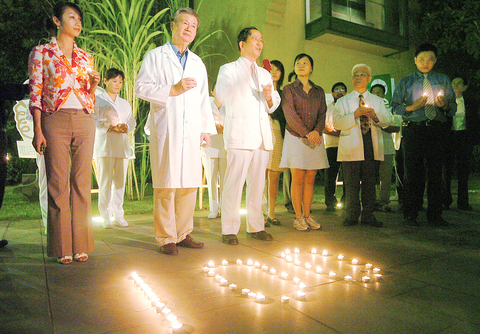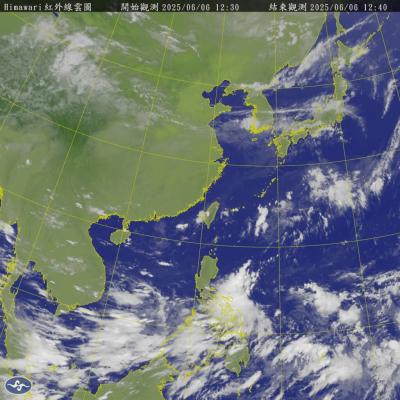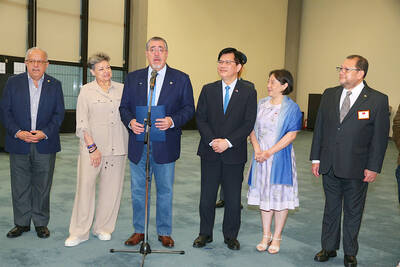The Democratic Progressive Party (DPP) legislative caucus yesterday requested that the pan-blue alliance offer an explanation for their opposition to the long-stalled arms procurement bill.
"While Chinese President Hu Jintao (
The arms procurement bill has been rejected by the legislature's Procedural Committee 36 times since the beginning of this legis-lative term in February.

PHOTO: LIU HSIN-DE, TAIPEI TIMES
The original NT$480 billion (US$15 billion) special arms procurement bill sought to purchase three PAC-3 Patriot anti-missile batteries, 12 P-3C maritime-patrol aircraft and eight diesel-electric submarines from the US.
At the request of opposition parties, the Executive Yuan has removed the NT$133 billion outlay earmarked for Patriot batteries over the next 15 years from the proposal, and included them in the Ministry of National Defense's annual budget instead, lowering the total amount of the special budget from NT$480 billion to around NT$350 million.
Despite the government's concession, the pan-blue alliance remains opposed to the watered-down version of the originally proposed bill.
Citing a recent example of the Taipei City Government's handling of the national flag, Lai theorized that the reason the pan-blue camp keeps opposing the arms procurement plan is to "raise China's national flag and lower Taiwan's."
Lai was referring to a national figure skating competition held at Taipei City's new indoor stadium on Tuesday. While there is a Chinese national flag flying at the venue, Taiwan's national flag is nowhere in sight.
DPP caucus whip Chen Chi-jun (陳景峻) said that the pan-blue camp is joining forces with Beijing because Beijing exerts itself to bully Taiwan not only on the military front, but also on the legislative, scientific and economic front.
Chen said that he would like to ask Taipei Mayor and Chinese Nationalist Party (KMT) Chairman Ma Ying-jeou (
In related news, DPP Legislator Lee Wen-chung (李文忠), who is a member of the legislature's National Defense Committee, yesterday said that his caucus will try to request a special budget or additional budget for Patriot anti-missile batteries this year or make the regular budget request next year. The defense committee recently crossed out NT$10.9 billion of the Patriot missile batteries' secret budget earmarked for next year.
His caucus would also file for a constitutional interpretation from the Council of Grand Justices to rule on the legitimacy of the country's first nationwide referendum.
In the poll, voters were asked to vote "yes" or "no" on whether they agree that the government should purchase more advanced anti-missile weapons to boost the nation's self-defense capabilities.
Although the vast majority of the respondents said "yes," the referendum failed to achieve the 50 percent threshold required to make it valid.
The pan-blue alliance of the Chinese Nationalist Party (KMT) and People First Party (PFP), however, say the invalid referendum represented the public's "veto" of the purchase of Patriot missiles.

Greenpeace yesterday said that it is to appeal a decision last month by the Taipei High Administrative Court to dismiss its 2021 lawsuit against the Ministry of Economic Affairs over “loose” regulations governing major corporate electricity consumers. The climate-related lawsuit — the first of its kind in Taiwan — sought to require the government to enforce higher green energy thresholds on major corporations to reduce emissions in light of climate change and an uptick in extreme weather. The suit, filed by Greenpeace East Asia, the Environmental Jurists Association and four individual plaintiffs, was dismissed on May 8 following four years of litigation. The

STAY AWAY: An official said people should avoid disturbing snakes, as most do not actively attack humans, but would react defensively if threatened Taitung County authorities yesterday urged the public to stay vigilant and avoid disturbing snakes in the wild, following five reported snakebite cases in the county so far this year. Taitung County Fire Department secretary Lin Chien-cheng (林建誠) said two of the cases were in Donghe Township (東河) and involved the Taiwan habus, one person was bit by a Chinese pit viper near the South Link Railway and the remaining two were caused by unidentified snakes. He advised residents near fields to be cautious of snakes hiding in shady indoor areas, especially when entering or leaving their homes at night. In case of a

A tropical disturbance off the southeastern coast of the Philippines might become the first typhoon of the western Pacific typhoon season, the Central Weather Administration (CWA) said. The system lacks a visible center and how it would develop is only likely to become clear on Sunday or Monday, the CWA said, adding that it was not yet possible to forecast the potential typhoon's effect on Taiwan. The American Meteorological Society defines a tropical disturbance as a system made up of showers and thunderstorms that lasts for at least 24 hours and does not have closed wind circulation.

DIPLOMACY: It is Guatemalan President Bernardo Arevalo’s first visit to Taiwan since he took office last year, while Eswatini’s foreign minister is also paying a visit A delegation led by Guatemalan President Bernardo Arevalo arrived in Taiwan yesterday afternoon and is to visit President William Lai (賴清德) today. The delegation arrived at Taiwan Taoyuan International Airport at 4:55pm, and was greeted by Minister of Foreign Affairs Lin Chia-lung (林佳龍). It is Arevalo’s first trip to Taiwan since he took office last year, and following the visit, he is to travel to Japan to celebrate the 90th anniversary of diplomatic relations between the two countries. Arevalo said at the airport that he is very glad to make the visit to Taiwan, adding that he brings an important message of responsibility